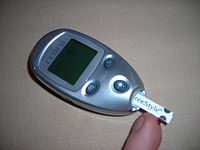
Intranasal Insulin Restores Metabolic Parameters and Insulin Sensitivity in Rats with Metabolic Syndrome
Sign Up to like & getrecommendations! Published in 2017 at "Bulletin of Experimental Biology and Medicine"
DOI: 10.1007/s10517-017-3762-6
Abstract: We studied the effect of 10-week treatment with intranasal insulin (0.5 IU/day) on glucose tolerance, glucose utilization, lipid metabolism, functions of pancreatic β cells, and insulin system in the liver of rats with cafeteria diet-induced… read more here.
Keywords: insulin; metabolic parameters; metabolic syndrome; insulin restores ... See more keywords

Intranasal Insulin Treatment Attenuates Metabolic Distress and Early Brain Injury After Subarachnoid Hemorrhage in Mice
Sign Up to like & getrecommendations! Published in 2020 at "Neurocritical Care"
DOI: 10.1007/s12028-020-01011-4
Abstract: Background Intranasal administration of insulin to the brain bypasses the blood brain barrier (BBB) and can increase cerebral glucose uptake and prevent energy failure. Intranasal insulin treatment has shown neuroprotective effects in multiple central nervous… read more here.
Keywords: brain; insulin treatment; intranasal insulin; sah ... See more keywords

Memory advancement by intranasal insulin in type 2 diabetes (MemAID) randomized controlled clinical trial: Design, methods and rationale.
Sign Up to like & getrecommendations! Published in 2020 at "Contemporary clinical trials"
DOI: 10.1016/j.cct.2020.105934
Abstract: BACKGROUND Type 2 diabetes mellitus (T2DM) accelerates brain aging and increases the risk for dementia. Insulin is a key neurotrophic factor in the brain, where it modulates energy metabolism, neurovascular coupling, and regeneration. Impaired insulin-mediated… read more here.
Keywords: insulin; t2dm; trial; long term ... See more keywords

Intranasal insulin ameliorates cognitive impairment in a rat model of Parkinson's disease through Akt/GSK3β signaling pathway.
Sign Up to like & getrecommendations! Published in 2020 at "Life sciences"
DOI: 10.1016/j.lfs.2020.118159
Abstract: AIMS Parkinson's disease dementia (PDD) is one of the most common non-motor symptoms of advanced Parkinson's disease (PD). This study aimed to determine whether intranasal insulin has protective effects on cognition in the rat PD… read more here.
Keywords: insulin; signaling pathway; parkinson disease; rat model ... See more keywords

Intranasal insulin treatment alleviates methamphetamine induced anxiety-like behavior and neuroinflammation
Sign Up to like & getrecommendations! Published in 2017 at "Neuroscience Letters"
DOI: 10.1016/j.neulet.2017.09.026
Abstract: Insulin, as a peptide hormone, has recently gained attention for its pro-cognitive, anti-inflammatory and neuroprotective effects in the central nervous system (CNS). Most studies have indicated anxiogenic and neuroinflammatory effects of methamphetamine (MA) and other… read more here.
Keywords: treatment; insulin treatment; like behavior; anxiety like ... See more keywords

Intranasal insulin activates Akt2 signaling pathway in the hippocampus of wild-type but not in APP/PS1 Alzheimer model mice
Sign Up to like & getrecommendations! Published in 2019 at "Neurobiology of Aging"
DOI: 10.1016/j.neurobiolaging.2018.11.008
Abstract: Type 2 diabetes mellitus (T2DM) increases the risk for Alzheimer's disease (AD). Human AD brains show reduced glucose metabolism as measured by [18F]fluoro-2-deoxy-2-D-glucose positron emission tomography (FDG-PET). Here, we used 14-month-old wild-type (WT) and APPSwe/PS1dE9… read more here.
Keywords: insulin; app ps1; intranasal insulin; mice ... See more keywords

Virtual grocery shopping and cookie consumption following intranasal insulin or placebo application.
Sign Up to like & getrecommendations! Published in 2019 at "Experimental and clinical psychopharmacology"
DOI: 10.1037/pha0000330
Abstract: Insulin receptors are present in brain areas that are involved in the control of hunger and satiety, and intranasal insulin is assumed to have an anorexigenic effect. This known influence of insulin on satiety encouraged… read more here.
Keywords: grocery shopping; insulin; intranasal insulin; cookie consumption ... See more keywords

Effects of intranasal insulin as an enhancer of fear extinction: a randomized, double-blind, placebo-controlled experimental study
Sign Up to like & getrecommendations! Published in 2020 at "Neuropsychopharmacology"
DOI: 10.1038/s41386-019-0593-3
Abstract: Fear-extinction based psychotherapy (exposure) is the most effective method for treating anxiety disorders. Notwithstanding, since some patients show impairments in the unlearning of fear and insufficient fear remission, there is a growing interest in using… read more here.
Keywords: fear; extinction; placebo; fear extinction ... See more keywords

Intranasal Insulin Boosts Gustatory Sensitivity
Sign Up to like & getrecommendations! Published in 2017 at "Journal of Neuroendocrinology"
DOI: 10.1111/jne.12449
Abstract: Intranasal insulin has been the subject of attention not only with respect to enhancing memory processes, but also for its anorexic effects, as well as its effects on olfactory sensitivity. In the present study, the… read more here.
Keywords: taste; sensitivity; application; gustatory sensitivity ... See more keywords

Intranasal insulin for treatment of delirium in older hospitalised patients: study protocol for a randomised controlled trial
Sign Up to like & getrecommendations! Published in 2021 at "BMJ Open"
DOI: 10.1136/bmjopen-2021-050765
Abstract: Introduction Delirium is one of the most common conditions diagnosed in hospitalised older people and is associated with numerous adverse outcomes, yet there are no proven pharmacological treatments. Recent research has identified cerebral glucose hypometabolism… read more here.
Keywords: insulin; delirium; trial; older hospitalised ... See more keywords

Intranasal Insulin Prevents Anesthesia-induced Cognitive Impairments in Aged Mice.
Sign Up to like & getrecommendations! Published in 2019 at "Current Alzheimer research"
DOI: 10.2174/1567205015666181031145045
Abstract: BACKGROUND Preclinical and clinical evidence suggests that elderly individuals are at increased risk of cognitive decline after general anesthesia. General anesthesia is also believed to be a risk factor for Postoperative Cognitive Dysfunction (POCD) and… read more here.
Keywords: insulin; anesthesia induced; insulin treatment; intranasal insulin ... See more keywords